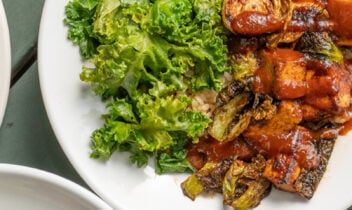
Best Supporting Actor in a Plant-Based Diet: Eggs
It’s a time of reckoning for fruits and veggies as Americans look to include more produce on their plates. According to the IFIC Food and Health survey, half of consumers are interested in learning more about plant-based eating habits, yet 50% thought that meeting protein needs would be difficult in a plant-based lifestyle. In addition, the Centers for Disease Control and Prevention state that only 1 in 10 are meeting recommendations for fruits and vegetables and previous studies have cited “high cost, limited availability and access, and perceived lack of cooking and preparation time can be barriers to fruit and vegetable consumption.” How then can Americans eat more “plant-forward” while meeting protein needs and addressing potential barriers?
First, the shift towards plant-forward meals does not mean plant only for multiple reasons. Choosing a variety of foods to round out a plant-based diet provides essential nutrients in adequate amounts. Additionally, smaller changes versus extreme shifts are often more sustainable. Therefore, in order to increase fruit and veggie intake for the long term while still including a variety, the American meal need not eliminate widely used animal-based foods, but rather restructure with produce promoted to the center of the plate.
And while some foods may struggle in an ensemble role, the Best Supporting Actor in a Plant-Based Diet goes to…eggs! Eggs offer nutrition, accessibility, and versatility; enhancing veggies without undermining them. Just one large egg offers 6 grams of high-quality protein and 8 essential nutrients, a unique nutrient package that perfectly complements the nutritional profile of vegetables. Eggs are familiar and accessible which makes the idea of a plant-based meal far more approachable for someone who may have never considered this type of dietary shift. Finally, eggs fit perfectly into different cuisines and culinary applications, providing endless inspiration for plant-forward meals. They can be scrambled into fried rice, fried and placed atop a veggie hash, baked into a spicy shakshuka, added to bind a black bean burger, or soft-boiled in a bath of vegetable ramen.
In all these illustrative examples, eggs add nutrition and richness without overpowering the veggies. Consider the naming of these dishes. Add chicken to the veggie fried rice and it automatically becomes billed as chicken fried rice. But eggs don’t need the credit; they don’t need to be the titular ingredient; they’re happy to share the plate with veggies without needing the spotlight. The essence of the plant-based movement is to eat more produce —and eggs play a crucial role in that. For all the reasons above, eggs round out a veggie-centric meal while maintaining the spirit of plant-based.
Written by Katie Hayes, RDN
References
- IFIC Food and Health Survey 2019
- https://www.cdc.gov/media/releases/2017/p1116-fruit-vegetable-consumption.html


